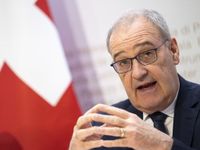The Ministry of Foreign Affairs (MoFA) in Pakistan has expressed serious concern regarding the recent decision by the United States to impose tariffs on various countries, stating that this could have far-reaching effects on global trade. During a weekly media briefing, spokesperson Shafqat Ali Khan emphasized that Pakistan is closely monitoring the situation and hopes for a mutually beneficial resolution. Khan noted that global trade is interconnected, and unilateral measures such as tariffs could disrupt trade balances. He reaffirmed Pakistan’s support for policies that are transparent, fair, and beneficial for all parties involved.
Previously, US President Donald Trump announced sweeping reciprocal tariffs on dozens of nations, including Pakistan, citing years of what he called unfair trade practices. The spokesperson stated that Pakistan is committed to promoting international economic partnerships and opposes any policy that could lead to trade imbalances or harm the economies of developing nations. Pakistan has urged the US to resolve the issue in a manner that serves the interests of all parties, in order to maintain stability and confidence in the global trading system.
In addition to the tariff concerns, the MoFA addressed the termination of the Global Undergraduate Exchange Program (Global UGRAD) for Pakistani students. This decision marks the end of a 15-year partnership that played a crucial role in enhancing educational and cultural ties, as well as strengthening bilateral relations centered on education, science, technology, and public engagement.
Looking ahead, the MOFA reiterated its strong support for a high-level international conference focused on the peaceful resolution of the Palestine conflict and the implementation of a two-state solution, scheduled for June 2025. The spokesperson expressed hope that the conference would take effective actions to restore hope for peace and justice. Khan expressed gratitude towards France and Saudi Arabia for co-chairing preparatory meetings for the June 2025 conference.
“We sincerely hope that the conference will take actions aligned with its purpose and restore hopes for peace and justice,” he said. Khan emphasized that prior to the conference, “a complete ceasefire should be enforced, the blockade of Gaza lifted, humanitarian access ensured, and safety provided for civilians and humanitarian staff.” He condemned any attempts to forcibly displace Palestinians or annex their land, calling for such actions to be unconditionally rejected and effectively prevented.
The spokesperson also denounced the ongoing aggression and atrocities by Israeli occupying forces, expressing sorrow over the recent deaths of 15 Palestinian emergency and civil defense workers due to direct gunfire. This statement underscores Pakistan's ongoing commitment to advocating for human rights and humanitarian issues in the region.
Meanwhile, in Switzerland, economics minister Guy Parmelin stated that the country has yet to enter formal tariff negotiations with the United States, despite having made contact with the administration. Parmelin explained that Switzerland is in the process of communicating to the US that other aspects are important in addition to the balance of trade, indicating that higher tariffs would hinder the willingness of Swiss companies to invest in the US.
State Secretary for Economic Affairs Helene Budliger Artieda has shown the US side “possible topics for substantive discussions” in recent days. During a telephone conversation with US President Donald Trump, Swiss President Karin Keller-Sutter emphasized that Swiss companies needed positive signals in order to continue or even increase their investments in the US market.
With the announced 31% tariffs, Switzerland would be discriminated against compared to other countries. The postponement of the punitive tariffs by 90 days announced by Trump on April 9, 2025, gives Switzerland “some room for manoeuvre,” according to Parmelin. He stated, “The Federal Council welcomes the temporary waiver of even higher tariffs.” However, he noted that the current tariff rate of 10% is also harmful to the economy, both globally and in Switzerland.
“All new tariffs have negative effects,” Parmelin added, pointing out that the big problem with the new US policy is the uncertainty it creates. This uncertainty destabilizes the global economy, and it is a concern that also affects Switzerland. “This worries the Federal Council,” he said.
In light of these developments, the Federal Council is working for the general interest of the population and the country, leaving open the question of whether Switzerland will join European Union sanctions. The ongoing discussions and negotiations highlight the complexities of international trade relations and the delicate balance countries must maintain in a rapidly changing global landscape.
In a related note, Swiss chocolate maker Barry Callebaut has suffered from soaring cocoa prices in the first half of the 2024-2025 financial year, further illustrating the challenges faced by businesses amid fluctuating trade policies and economic conditions. As countries navigate these turbulent waters, the interconnectedness of global trade becomes increasingly apparent, underscoring the need for cooperation and dialogue among nations.
As the world watches these developments unfold, it remains crucial for countries to engage in constructive dialogue and seek resolutions that promote stability and prosperity for all. The actions taken in the coming weeks and months will undoubtedly have significant implications for international relations, trade, and economic partnerships.





